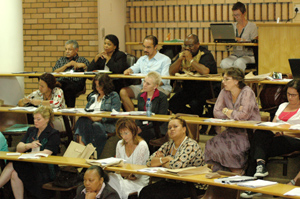New leadership needed in higher education
14 April 2008 |
It's time for real change in the higher education sector and not just a change from trousers to skirts, a form of gender window-dressing, Minister of Education Naledi Pandor said.
Pandor was addressing delegates at the recent two-day Higher Education South African (HESA) conference, spearheaded by HERS-SA, a network to improve women's status in higher education.
It was attended by over 100 delegates from Africa and was one of several recent campus-based initiatives that brought the subject of women in higher education into sharp focus.
HESA's chief executive officer, Professor Duma Malaza, said: "We have succeeded in enrolling at least as many women students as men in our institutions. In 2006 women comprised 55% of the total student body. It is time for institutions to facilitate a more prominent role by women in senior management."
Though only three of South Africa's 23 universities are headed by women, Pandor was more interested in the quality of leadership "It's about transforming the institution," she said.
"South Africa has had a democratic Constitution for 14 years. It is transformative in context and intent. Yet if we were to examine all universities against precepts of our Bill of Rights, we would have to agree that university practices fall short of its ideals."
Referring to the Reitz residence incident at the University of the Free State, Pandor said it concerned her that such an incident, which had humiliated society's most disempowered - black women - had occurred at a university.
She outlined her own definition of transformation, one that underscores key constitutional principles.
"The intention is to provide our aspirant women leaders with some indication of the agenda we expect them to pursue.
"The time has come for leaders in all sectors to earn support, rather than to expect support because of their race, gender or any other status."
 |
Pandor said that while they wanted to promote women leadership in higher education, they would not clone practices and approaches that had not "turned higher education on its head".
"All of you will recall how new VCs are appointed through open engagement with stakeholders, through public addresses and open question sessions.
"Once appointed, there is never a university-wide forum, never open discussion of university finances, never stakeholder engagement and rarely direct access to the once-very-accessible candidate.
"What is the point of this tedious assault on university? The intention is to provide our aspirant women leaders some indication of the agenda we expect them to pursue."
Former UCT Vice-Chancellor Dr Mamphele Ramphele delivered the opening address on diversity in leadership.
Ramphele argued that the oppressed must "redefine themselves".
"We need to shift to an enabling culture."
Professor Lydia Brito, assistant professor at Eduardo Mondlane University in Mozambique, argued for "building the bridges of comprehension" in order to "reinvent leadership" in her address. "Women bring a lot of skills to leadership," she said, quipping that women were "better at multitasking".
Dean of the Faculty of Sciences, Professor Kathy Driver, presented statistics showing the poor representation of females in upper leadership positions in higher education, and stressed the need to encourage women into leadership positions.
Why is there a dearth of women at this level? Dr Sarah Riordan presented some insights at a South African Women in Science and Engineering (SAWISE) meeting a few days before the HESA conference. The work presented underpinned her PhD on the career success of women academics.
With plenty of research available on factors that hinder women, Riordan said she had focused instead on the factors that contribute to success.
"How is it that with all the apparent evidence to suggest that women struggle to advance to senior positions within universities around the world, some have managed to succeed?"
What has them to succeed? To find answers, Riordan conducted research at 11 'traditional' South African universities.
"First, we need to recognise that women are not a homogenous group."
Like Pandor, Riordan pointed to "legislated opportunities" and structures that now favour women's careers.
"Concentrate on research outputs and play a greater role in decision-making bodies that operate at the highest levels of your institutions," she advised.
"Women academics who are serious about staying in higher education and advancing their careers need to take personal responsibility for ensuring their success, and become aware of career success predictors."
Riordan suggests they start by identifying their career anchors, their work centrality, self-efficacy and motivation to become part of the university decision-making structures.
"They could look for and seize opportunities to contribute to strategic decisions in their universities.
"They could also focus their energy towards producing research outputs, and refuse work assignments that detract from research activities.
In short, they could start emulating those 'special' women who have achieved career success.
A Conference Declaration was signed afterwards, addressed to government, higher education institutions and research organisations responsible for ensuring equity in higher education. It calls for action to improve gender equality in academic and administrative leadership in all levels of higher education, and complements existing charters and regulations concerning gender equity.
 This work is licensed under a Creative Commons Attribution-NoDerivatives 4.0 International License.
This work is licensed under a Creative Commons Attribution-NoDerivatives 4.0 International License.
Please view the republishing articles page for more information.










